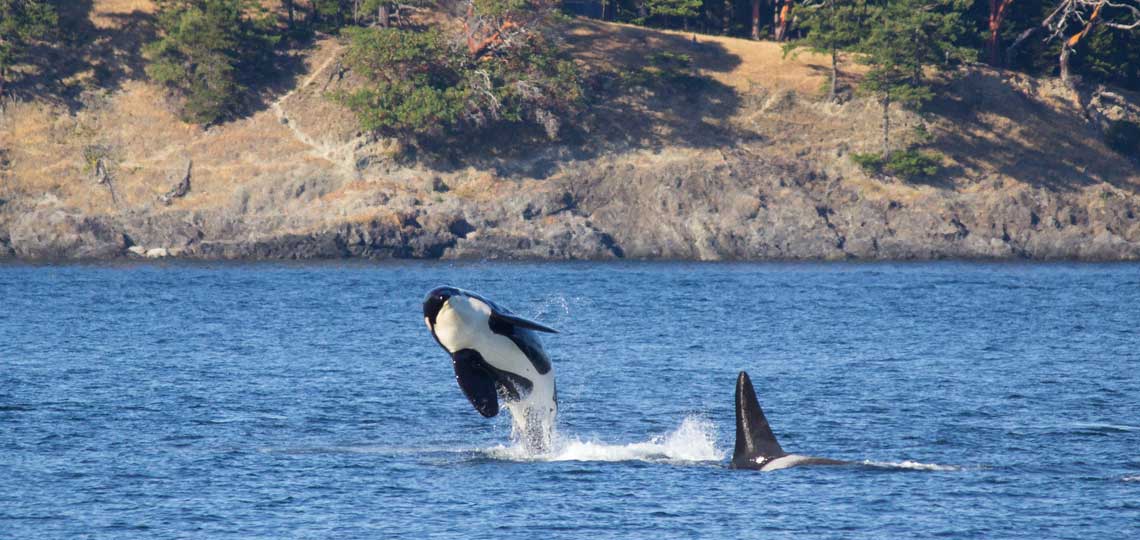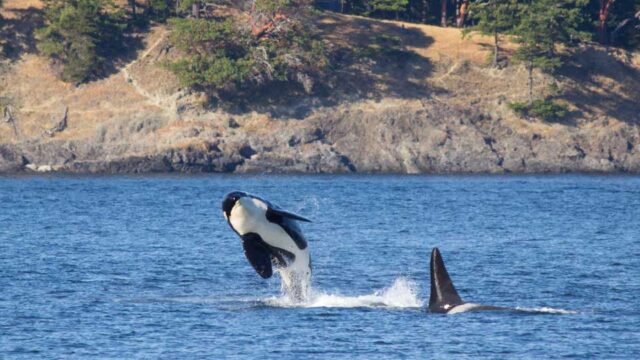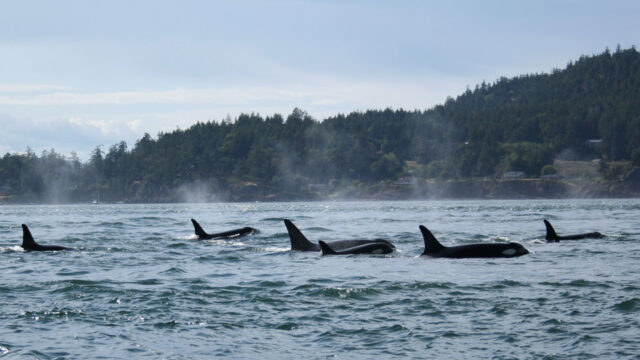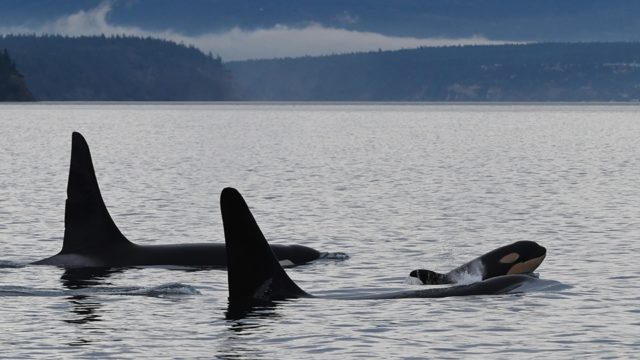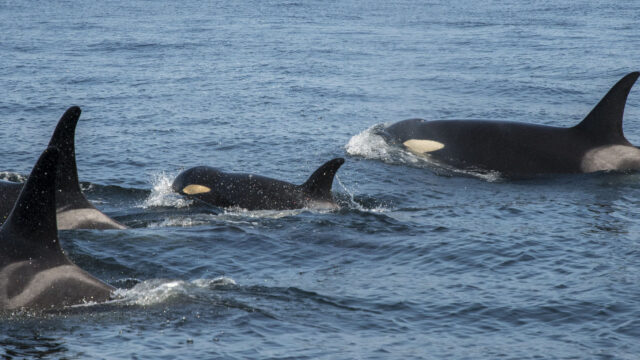The groups remain undeterred in their decade long fight to protect the 73 remaining Southern Resident Killer Whales.
VANCOUVER/UNCEDED xʷməθkʷəy̓əm (MUSQUEAM), Sḵwx̱wú7mesh (SQUAMISH) AND səlilwətaɬ (TSLEIL-WAUTUTH) TERRITORIES: The David Suzuki Foundation, Georgia Strait Alliance, Raincoast Conservation Foundation and the Wilderness Committee, represented by Ecojustice, have filed an application for a judicial review in the Federal Court, challenging the federal government’s decision to approve the Roberts Bank Terminal 2 Project, under the Canadian Environmental Assessment Act.
Some of the largest salmon runs in the world migrate through Roberts Bank as juveniles and adults. The Salish Sea provides critical habitat for the remaining 73 endangered Southern Resident Killer Whales. Fisheries and Oceans Canada (DFO) recently confirmed that the Fraser River estuary is a high-use area within that critical habitat. The March 2020 report, by an independent federal review panel, assessed that the new terminal would result in destruction of the legally protected Southern Resident Killer Whale’s critical habitat. The construction would lead to reduced Chinook salmon availability and increased underwater noise from shipping traffic.
Notwithstanding these findings, and the Minister of Environment and Climate Change’s determination that the Project was likely to cause significant adverse environmental effects that cannot be fully mitigated, the federal government approved the project last month.
The conservation groups argue that the approval is unlawful, as a project cannot be deemed “justified” under environmental assessment legislation when it is contrary to another statute – the Species at Risk Act. Just days ago, Minister of Environment and Climate Change Steven Guilbeault said, “We are facing a biodiversity crisis that is exacerbated by a pollution crisis and a climate crisis. Ambition must be matched by implementation.”
If the federal government is to address this biodiversity crisis and help save the iconic whales of the West Coast, and the Chinook salmon they depend on, the Roberts Bank Terminal 2 Project cannot continue.
Jeffery Young, senior science and policy analyst for the David Suzuki Foundation said: “The federal government has failed Canadians by approving this new terminal. Their own environmental review showed this project could condemn Southern Resident killer whales, and the Chinook salmon they depend on, to extinction.”
Lucero González Ruiz, Biodiversity Lead, Georgia Strait Alliance said: “We cannot keep putting the economy above the environment if we’re going to halt the alarming extent of biodiversity loss. Decisions like these are putting immense pressure on the 73 Southern Resident orcas left in the wild and increasing their chances of extinction.”
Misty MacDuffee, Wild Salmon Program Director, Raincoast Conservation Foundation, said: “The Fraser River estuary is a globally important region already suffering the effects of our human footprint. It is a fallacy that the federal conditions will prevent Terminal 2 from causing harm to threatened wildlife species that rely on this irreplaceable habitat. ”
Charlotte Dawe, conservation and policy campaigner for the Wilderness Committee, said: “What’s the purpose of laws to protect the public, the environment and wildlife from irreversible harm if the government continuously overrides them in the name of supposed ‘economic’ benefits? We should not have to take the government to court in order for them to enforce their own laws so that human communities, the environment and wildlife are appropriately and effectively protected.”
Dyna Tuytel, staff lawyer at Ecojustice, said: “By deeming the significant adverse effects on endangered species to be “justified” under environmental assessment legislation, the government is shirking its responsibilities under the Species at Risk Act. The law obligates them to ensure that feasible measures are in place to protect the iconic and endangered Southern Resident Killer Whales before approving harmful industrial projects, and it does not allow for destruction of their critical habitat or jeopardy to their survival.”
Background:
Since 2014, Ecojustice has represented the David Suzuki Foundation, Georgia Strait Alliance, Raincoast Conservation Foundation, and Wilderness Committee in the environmental assessment of the Roberts Bank Terminal 2 Project, including making submissions on their behalf at hearings held by a federally appointed independent review panel in 2019. The groups presented expert evidence about the impacts of the project, which included increased underwater noise and its negative impact on Southern Resident killer whales, marine pollution, threats to wild salmon and their rearing habitat, and threats to the other 119 species that call the Salish Sea home.
In 2020, the review panel concluded that the project would have “numerous” adverse effects on the environment, including “significant adverse effects on Chinook salmon” and “significant adverse and cumulative effects on Southern Resident killer whales”, which include destruction of Southern Resident killer whale critical habitat.
Since then, the Port Authority has made modifications to its original proposal that it claims will reduce the harmful effects of the project, and the federal government has attached conditions to its approval of the Project. However, these fall short of mitigating the project’s effects, and this Project remains a serious threat to biodiversity and long-term survival of species in the area.
In December 2022, Canada committed to halting species extinction under the Kunming-Montreal Global Biodiversity Framework to halt species extinction. Considering that commitments and in light of the dramatic and irreversible environmental impacts this project will have on Chinook salmon and endangered killer whales, this project should never have been given the greenlight.
About:
The David Suzuki Foundation (DavidSuzuki.org | @DavidSuzukiFdn) is a leading Canadian environmental non-profit organization, founded in 1990. We operate in English and French, with offices in Vancouver, Toronto and Montreal. We collaborate with all people in Canada, including First Nations leadership and communities, governments, businesses and individuals to find solutions to create a sustainable Canada through scientific research, traditional ecological knowledge, communications and public engagement, and innovative policy and legal solutions. Our mission is to protect nature’s diversity and the well-being of all life, now and for the future.
Grounded in environmental justice, Georgia Strait Alliance mobilizes and supports collective action to protect the Salish Sea region in order to achieve the vision of a Salish Sea teeming with life where thriving and just communities live in balance with the environment.
Raincoast Conservation Foundation is a team of conservationists and scientists empowered by our research to protect the lands, waters and wildlife of coastal British Columbia. We use rigorous, peer-reviewed science and community engagement to further our conservation objectives. We investigate to understand coastal species and processes. We inform by bringing science to decision-makers and communities. We inspire action to protect wildlife and wildlife habitats.
Envisioning a Canada where wilderness and wildlife thrive for the benefit of all, the Wilderness Committee works to protect life-giving biological diversity through strategic research, community mobilizing and grassroots public education.
Ecojustice goes to court and uses the power of the law to defend nature, combat climate change, and fight for a healthy environment. Its strategic, innovative public interest lawsuits lead to legal precedents that deliver lasting solutions to Canada’s most urgent environmental problems. As Canada’s largest environmental law charity, Ecojustice operates offices in Vancouver, Calgary, Toronto, Ottawa, and Halifax.

